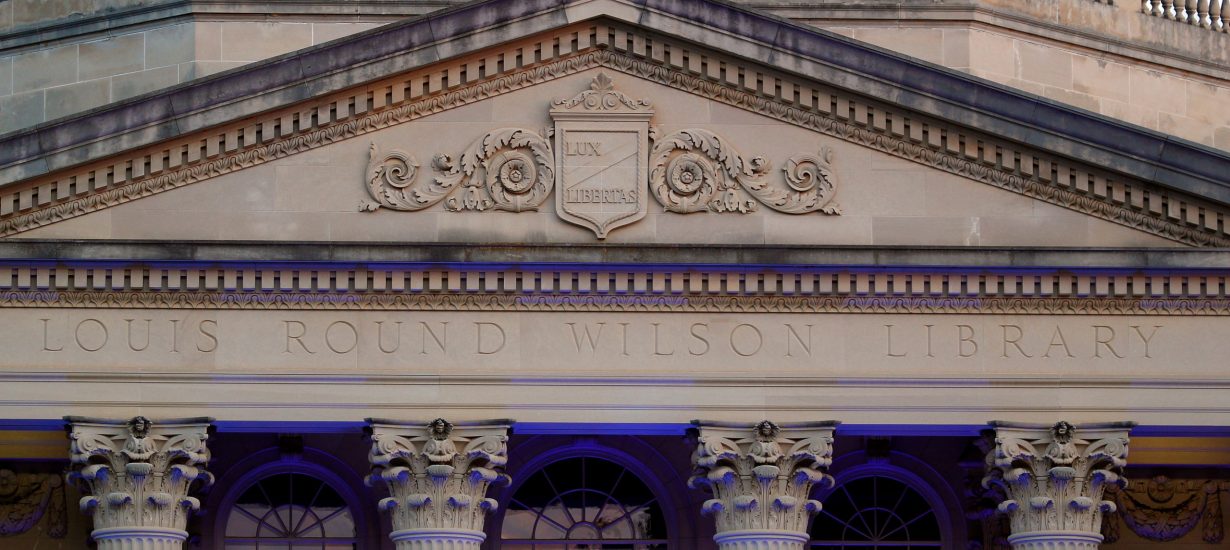- Membership
- Perks and Discounts
- Things To Do
- Resources
- News
- About
- Shop
Related Content
Ackland Returns Painting to Rightful Owners
April 29, 2024
UNC’s Ackland Art Museum made headlines nationwide this year when it returned a 19th-century oil...
Read MoreDental Students to Provide Free Care to Local Children
Feb. 1, 2024
The Adams School of Dentistry on Feb. 2 will offer free oral health care services...
Read MoreOur State, Our Work Highlights Success in Statewide Summit
Nov. 16, 2023
The UNC Friday Center will host Nov. 29 the inaugural Statewide Summit on Re-engaging Opportunity...
Read More-
2024
-
2023
-
2022
-
2021
-
2020
-
2019
-
2018
-
2017
-
2016
-
2015
-
2014
-
2013
-
2012
-
2011
-
2010
-
2009
-
2008
-
2007
-
2006
-
2005
-
2004
- Academics and Athletics
- Admissions
- Alumni Profiles
- Alumni Recognition
- Around Town
- Arts
- Books
- Campus Profile
- Campus Safety
- Carolina Alumni Awards
- Carolina Alumni Leadership
- Carolina Alumni Programs and Outreach
- Carolina Alumni Reunions
- Carolina Alumni Review
- Celebrations
- Championships
- College and Costs
- Commencement
- Coronavirus
- Discovery
- Extracurricular
- Faculty
- Faculty Awards
- For the People
- Go Heels
- Greek Life
- Hark the Sounds
- Higher Education
- Homecoming
- In Class
- In Memoriam
- Innovation and Technology
- Issues
- Object Lesson
- On View
- Our Treescape
- Philanthropy
- Podcast
- Public Service
- Race and Reckoning
- Research
- Sexual Assault
- Silent Sam
- Sports
- Structures
- Student Achievement
- Students
- Timelines
- Tuition and Financial Aid
- UNC Libraries
- UNC’s History
- Undergraduate Spotlight
- University Achievements
- University Awards
- University Budget Issues
- University Development
- University Leadership
- University News
- University Rankings
- What We Do
- Who We Are
- Young Alumni
- Yours at Carolina
Library Collection to Help Communities Own Their Stories

The University has received an $877,000 grant from the Andrew W. Mellon Foundation that will enable the Southern Historical Collection to further develop its transformative model for community-driven archives. In addition to several community archiving projects, the SHC will develop and share training and educational materials in this emerging area of practice.
Activities for the three-year grant are beginning immediately.
Community-driven archives are created through partnerships between a community that wishes to document and preserve its own history and an archival repository. In many cases, these are stories of marginalized communities that past generations of historians and archivists did not consider significant enough to record or preserve.
“These projects let us reach communities where people tell us, ‘I didn’t think anyone cared about our history,’ ” said SHC Director Bryan Giemza ’99 (JD), who also earned a master’s degree from Carolina in 2001 and his doctorate in 2004.
Giemza thinks having the community direct archiving activities with support from an archivist can foster trust and understanding. At the same time, establishing a more complete historical record benefits everyone who seeks to understand the past and the present.
“It’s a very democratic process that places the owners of the story at the center of documentary efforts. We are grateful to the Mellon Foundation for supporting work that leads to dialogue, truth and even reconciliation, by creating opportunities for Americans to learn from and about one another,” Giemza said.
As part of the grant, the SHC will hire a full-time community archivist and advance or complete four community archiving projects currently under way: the Appalachian Student Health Coalition, the Eastern Kentucky African-American Migration Project, the Historic Black Towns and Settlements Alliance and the San Antonio African-American Community Archive and Museum.
The SHC will develop a web-based resource to connect researchers with potential community archives projects. Additionally, the SHC will use the grant to share the information about its processes so other archives and communities can replicate them. This includes innovations such as the “archivist in a backpack,” which contains starter materials and instructions, protective document sleeves, a microphone and activity suggestions. The SHC also will hold a publishing workshop so participants can reflect on and create a record of their own experiences.
© 2024 Carolina Alumni
